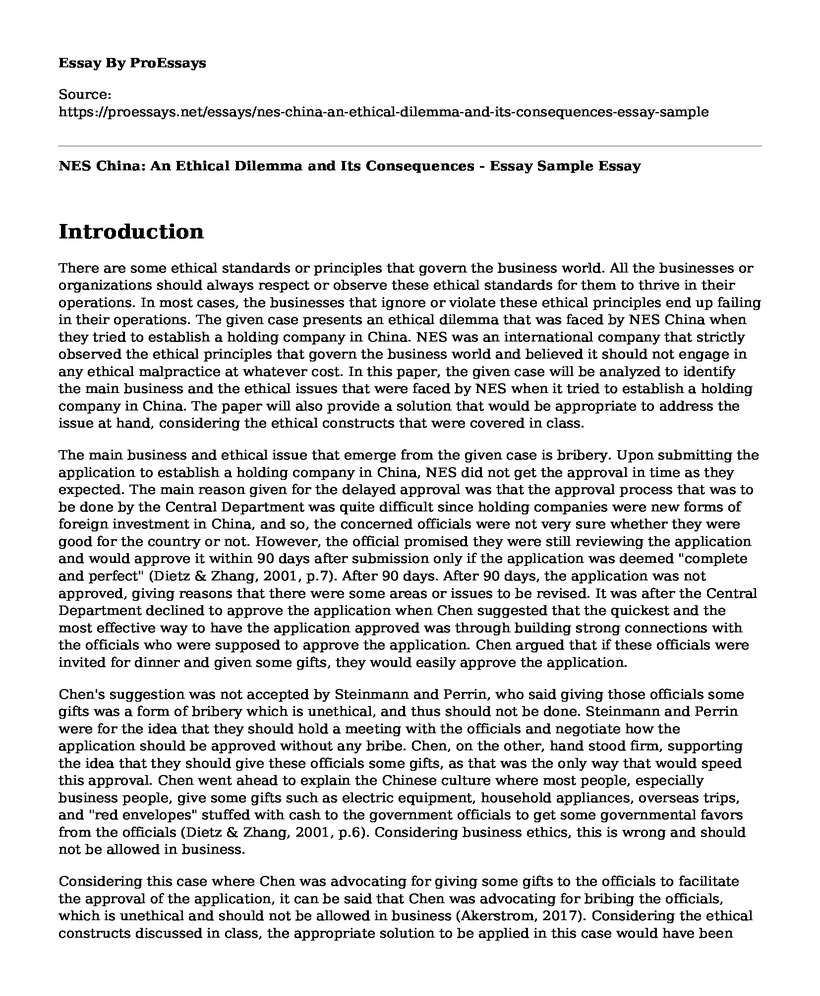Introduction
There are some ethical standards or principles that govern the business world. All the businesses or organizations should always respect or observe these ethical standards for them to thrive in their operations. In most cases, the businesses that ignore or violate these ethical principles end up failing in their operations. The given case presents an ethical dilemma that was faced by NES China when they tried to establish a holding company in China. NES was an international company that strictly observed the ethical principles that govern the business world and believed it should not engage in any ethical malpractice at whatever cost. In this paper, the given case will be analyzed to identify the main business and the ethical issues that were faced by NES when it tried to establish a holding company in China. The paper will also provide a solution that would be appropriate to address the issue at hand, considering the ethical constructs that were covered in class.
The main business and ethical issue that emerge from the given case is bribery. Upon submitting the application to establish a holding company in China, NES did not get the approval in time as they expected. The main reason given for the delayed approval was that the approval process that was to be done by the Central Department was quite difficult since holding companies were new forms of foreign investment in China, and so, the concerned officials were not very sure whether they were good for the country or not. However, the official promised they were still reviewing the application and would approve it within 90 days after submission only if the application was deemed "complete and perfect" (Dietz & Zhang, 2001, p.7). After 90 days. After 90 days, the application was not approved, giving reasons that there were some areas or issues to be revised. It was after the Central Department declined to approve the application when Chen suggested that the quickest and the most effective way to have the application approved was through building strong connections with the officials who were supposed to approve the application. Chen argued that if these officials were invited for dinner and given some gifts, they would easily approve the application.
Chen's suggestion was not accepted by Steinmann and Perrin, who said giving those officials some gifts was a form of bribery which is unethical, and thus should not be done. Steinmann and Perrin were for the idea that they should hold a meeting with the officials and negotiate how the application should be approved without any bribe. Chen, on the other, hand stood firm, supporting the idea that they should give these officials some gifts, as that was the only way that would speed this approval. Chen went ahead to explain the Chinese culture where most people, especially business people, give some gifts such as electric equipment, household appliances, overseas trips, and "red envelopes" stuffed with cash to the government officials to get some governmental favors from the officials (Dietz & Zhang, 2001, p.6). Considering business ethics, this is wrong and should not be allowed in business.
Considering this case where Chen was advocating for giving some gifts to the officials to facilitate the approval of the application, it can be said that Chen was advocating for bribing the officials, which is unethical and should not be allowed in business (Akerstrom, 2017). Considering the ethical constructs discussed in class, the appropriate solution to be applied in this case would have been having regular meetings with the officials to discuss how this approval would have been done without any form of bribery. The NES representatives would have convinced the officials to approve the application by explaining to them how the holding company will operate and the possible benefits that it would bring to the Chinese society and the whole country.
References
Akerstrom, M. (2017). Suspicious gifts: bribery, morality, and professional ethics. Routledge.
Dietz, J., & Zhang, X. (2001). NES China: Business Ethics (A). Ivey Publishing.
Cite this page
NES China: An Ethical Dilemma and Its Consequences - Essay Sample. (2023, Apr 11). Retrieved from https://proessays.net/essays/nes-china-an-ethical-dilemma-and-its-consequences-essay-sample
If you are the original author of this essay and no longer wish to have it published on the ProEssays website, please click below to request its removal:
- McDonalds Financial Analysis Paper
- Global Strategy Marketing Essay
- Ethical and Moral Practices of Doing Business in Europe Paper Example
- Essay Example on JetBlue: Innovative Airline, Non-Unionized, But Abiding by EEOC Laws
- Essay Example on Ads Everywhere: The Growing World of Brands
- Organizational Readiness for Change Theory: Cybercrime Risks in Transport Sector - Essay Sample
- Essay Example on Grow Business with GYB & DYB: Augmenting Business Sustainability







